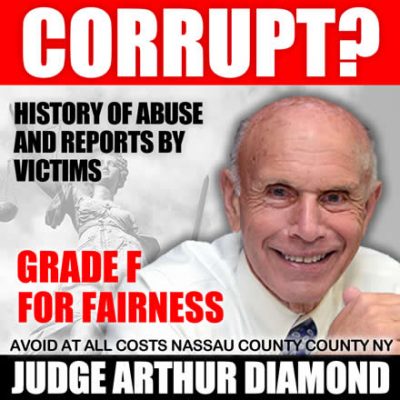Corrupt Macomb County
Other Dishonorable Read More
Probate is the judicial process whereby a will is “proved” in a court of law and accepted as a valid public document that is the true last testament of the deceased, or whereby the estate is settled
Other Dishonorable Read More

VICTIMS: Marian Kornicki Court Victim Bertha Kornicki Court Victim Judge Arthur M. Diamond received his undergraduate degree from Rutgers University in 1974 and his J.D. from Hofstra University School of Law in 1978. Prior to being elected to the supreme court, Diamond served as a county court judge in 1999 and was reappointed in 2000. Diamond began his career in 1979 at the Nassau County District Attorney’s Office, where he worked until 1986. Tenure Term ends 2031 HON. ARTHUR M. DIAMOND, J.S.C. Supreme Court, Nassau County 100 Supreme Court Drive Mineola, New York 11501 IAS Part 7 Principal Law Clerk: Ronald J. Ferraro, Esq. – email [email protected] Secretary: Kathleen Nolan – Phone (516) 493-3180 / Fax (516) 493-3068 Part Clerk: George Ebanks NEW YORK STATE BAR ASSOCIATION BIO Arthur M. Diamond NYS Supreme Court 3rd Floor, 100 Supreme Court Drive Mineola, NY 11501-4802 [email protected] (516) 493-3180 Arthur M. Diamond has served as a Justice of the New York State Supreme Court since January, 2004. He was re-elected to his second fourteen year term in November of 2017. Justice Diamond is a graduate of Rutgers University (New Brunswick 1974) and Hofstra University School of Law (JD 1978). He began his legal career in the Office of the Nassau County District Attorney Denis Dillon where he spent eight years and served as Deputy Chief of the Trial Bureau. In 1999 and 2000 he was appointed to the County Court by Gov. George Pataki. His column, Evidentially Speaking, appears regularly in the Nassau Lawyer, the official publication of the Nassau County Bar Association. He has lectured on evidence at the Nassau County Bar Association, the New York State Bar Association, the New York County Lawyers Association, the Judicial Seminars at the New York… Read More